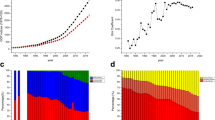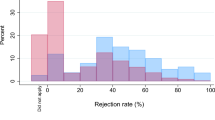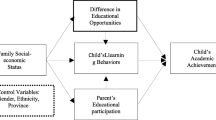Abstract
This paper is an empirical investigation of inequality of education opportunities in the Middle East and North Africa (MENA). We use student scores from tests administered by the international consortium Trends in Mathematics and Science Study (TIMSS) for a number of MENA countries and over time since 1999 to estimate the effect of circumstances children are born into on their academic achievement in science and mathematics. We find that inequality of opportunities explains a significant part of the inequality in educational achievements in most MENA countries, but there is ample heterogeneity. Family background variables are the most important determinants of inequality in achievement, followed by community characteristics. The results show that, despite great efforts in past decades to invest in free public education, most MENA countries are less opportunity equal in educational achievement than European countries, and several are less so than Latin America and the United States. From the variation in inequality of education opportunities across countries and over time we draw lessons on the influence of different education systems or changes in policy on equality of opportunity.
Similar content being viewed by others
References
Assaad, R., Kraft, C., Hassine, N.B., Salehi-Isfahani, D.: Inequality of opportunity in child health in the Arab World and Turkey. Middle East Dev. J. 4(2), 3–40 (2012)
Banerjee, A., Duflo, E.: Poor Economics: A Radical Rethinking of the Way to Fight Global Poverty. Public Affairs, New York (2011)
Barro, R., Lee, J.-W.: A new data set of educational attainment in the world, 1950-2010. Technical report, NBER Working Paper No. 15902 (2010)
Bibi, S., Nabli, M.K.: Income inequality in the Arab region: data and measurement, patterns and trends. Middle East Dev. J. 1(2), 275–314 (2009)
Bourguignon, F., Ferreira, F.H.G., Menendez, M.: Inequality of opportunity in Brazil. Rev. Income Wealth 53(4), 585–618 (2007)
Bratti, M., Checchi, D., de Blasio, G.: Does the expansion of higher education increase the equality of educational opportunities? evidence from Italy. Labour 22(Special Issue), 53–88 (2008)
Checchi, D., Peragine, V.: Regional disparities and inequality of opportunity: the case of Italy. IZA Working Paper 1874 (2005)
Checchi, D., Peragine, V.: Inequality of opportunity in Italy. J. Econ. Inequal. 8, 429–450 (2010)
Dardanoni, M., Peracchi, F.: Regression with imputed covariates: a generalized missing-indicator approach. J. Econ. 162(2), 362–368 (2011)
Dardanoni, V., Fields, G., Roemer, E.J., Sanchez-Puerta, L.M.: How Demanding Should Equality of Opportunity Be and How Much We Have Achieved? Stanford University Press, Paolo Alto (2006)
Dardanoni, V., Luca, G.D., Modica, S., Peracchi, F.: A generalized missing-indicator approach to regression with imputed covariates. EIEF Working Papers Series, 1111, Einaudi Institute for Economic and Finance (EIEF) (2011)
de Carvalho, M., Gamboa, L.F., Waltenberg, F.D.: Equality of Educational Opportunity Employing Pisa Data: Taking Both Achievement and Access into Account. Working Paper 2012 277, ECINEQ (2012)
Elbadawy, A., Ahlburg, D., Assaad, R., Levison, D.: Private and group tutoring in Egypt: where is the gender inequality. Paper presented at the XXVI IUSSP International Population Conference, Marrakech, Morocco, 27 September–2 October 2009 (2009)
Farah, S.: Private Turoting Trends in the UAE. Dubai School of Government Policy Brief (2011) http://www.dsg.ae/LinkClick.aspx?fileticket=EV-GkgeR7EA
Ferreira, F.H.G., Gignoux, J.: The measurement of inequality of opportunity: theory and an application to Latin America. Rev. Income Wealth 57(4), 622–657 (2011)
Ferreira, F.H.G., Gignoux, J.: The measurement of educational inequality: achievement and opportunity. World Bank Econ. Rev., forthcoming (2013)
Ferreira, F.H.G., Gignoux, J., Aran, M.: The measurement of inequality of opportunity with imperfect data: the case of Turkey. J. Econ. Inequal. (2011)
Fuchs, T., Woessmann, L.: What accounts for international differences in student performance? a re-examination using PISA data. Cesifo working paper 1235 (2004)
Hanushek, E.A., Woessmann, L.: The Role of Education Quality for Economic Growth. SSRN eLibrary (2007)
Lefranc, A., Pistolesi, N., Trannoy, A.: Equality of opportunity and luck: definitions and testable conditions, with an application to income in France. J. Public Econ. 93(11–12), 1189–1207 (2009)
Marrero, G.A., Rodriguez, J.G.: Inequality of Opportunity and Growth. Technical report (2010)
Martin, M.O., Mullis, I.V., Chrostowski, S.J.: Timss 2003 Technical Report: Findings from iea’s Trends in International Mathematics and Science Study at the Fourth and Eighth Grades. Technical Report, International Association for the Evaluation of Educational Achievement (2004)
Olson, J., Martin, M., Mullis, I.E.: TIMSS 2007 Technical Report. TIMSS & PIRLS International Study Center, Boston College, Chestnut Hill (2008)
Roemer, J.E.: Equality of Opportunity. Harvard University Press, Cambridge (1998)
Royston, P., White, I.R.: Multiple imputation by chained equations (MICE): implementation in Stata. J. Stat. Softw. 45(4), 1–20 (2011)
Rubin, D.B.: Multiple Imputation for Nonresponse in Surveys. New York (1987)
Salehi-Isfahani, D.: Education, jobs, and equity in the Middle East and North Africa. Comp. Econ. Stud. 54(4), 843–861 (2012)
Salehi-Isfahani, D.: Rethinking human development in the Middle East and North Africa: the missing dimensions. J. Human Dev. Capabil. (forthcoming) (2013)
Salehi-Isfahani, D., Belhaj-Hassine, N., Assaad, R.: Equality of Opportunity in Education Achievement in the Middle East and North Africa. Technical report, Economic Research Forum working paper, no. 689 (2012)
Schutz, G., Ursprung, H.W., Woessmann, L.: Education policy and equality of opportunity. Kyklos 61(2), 279–308 (2008)
Sterne, J.A.C., White, I.R., Carlin, J.B., Spratt, M., Royston, P., Kenward, M.G., Wood, A.M., Carpenter, J.R.: Multiple imputation for missing data in epidemiological and clinical research: potential and pitfalls. Br. Med. J. 338 (2009)
Tansel, A.: Private Tutoring and the Question of Equitable Opportunities in Turkey. Technical report, Economic Research Forum, Cairo (2013)
Tansel, A., Bircan, F.: Demand for education in Turkey: a Tobit analysis of private tutoring expenditures. Econ. Educ. Rev. 25(3), 303–313 (2006)
United Nation: Arab Human Development Report 2003: Building a Knowledge Society. United Nations Development Programme, New York (2003)
Woessmann, L.: Schooling resources, educational institutions and student performance: the international evidence. Oxf. Bull. Econ. Stat. 65(2), 117–170 (2003)
Woessmann, L.: How Equal Are Educational Opportunities? Family Background and Student Achievement in Europe and the United States. Cesifo working paper 1162. Munich (2004)
World Bank: The Road not Traveled: Education Reform in the MENA Region. World Bank, Washington (2007)
World Bank: World Development Indicators. Data base, the World Bank, Washington (2012)
Author information
Authors and Affiliations
Corresponding author
Additional information
Funding for this project was provided by the Economic Research Forum under its Research Initiative for Arab Development. We benefited from comments from T. Paul Schultz and two anonymous referees. Ali Hashemi, Bryce Stucki, and Christiane Wissa provided able research assistance.
Rights and permissions
About this article
Cite this article
Salehi-Isfahani, D., Hassine, N.B. & Assaad, R. Equality of opportunity in educational achievement in the Middle East and North Africa. J Econ Inequal 12, 489–515 (2014). https://doi.org/10.1007/s10888-013-9263-6
Received:
Accepted:
Published:
Issue Date:
DOI: https://doi.org/10.1007/s10888-013-9263-6




